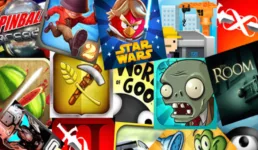But could it be that this lucrative branch of the video game industry is only just getting started?
The clearest reason for this question being asked is the advent of virtual reality gaming, which has proven to be just as closely related to existing smartphones as it is to brand new headsets. Devices like the HTC Vive, PlayStation VR, and Oculus Rift dominate the headlines, and will almost certainly be considered the “best” VR devices once we’ve all had a little more time to digest them. However, devices like the Samsung Gear VR and the Google Daydream VR (which work with the Galaxy and Pixel phones, respectively) have proven to be far more affordable and accessible. With these devices, users can slide their smartphones into headsets and enjoy simpler, but still thoroughly engaging VR games. Meanwhile, while the VR market seemed to sneak up on smartphones, there are already rumors of release dates for Apple’s
answer to the Gear VR and Daydream VR, meaning it’s only a matter of time before iPhone users are also in on the fun. All of this means that in the coming years we’ll begin to see a shift toward the development of new gaming options for mobile devices equipped with compatible VR gear.
When we talk about emerging markets and genres in mobile gaming, it’s also necessary to point out the relatively recent (and ongoing) expansion of the online gaming market on mobile platforms. Sites hosting blackjack, poker, and other related games have long been popular on the internet, and are now regularly expanding to mobile devices to great effect. This doesn’t necessarily generate the same kind of headline publicity as, say, the VR phenomenon, but it may ultimately be just as significant in keeping users interested in entertainment on their phones and tablets. We’ve always been able to play card and casino games on our phones, but the expansion of established online platforms offers a richer experience for what’s actually a hugely popular genre of gaming. People can now play sophisticated card and table games in secure, competitive environments with other players from all over the world, and this is only getting started.
Finally, we should also remark on the significance of Nintendo dipping its toe into the mobile gaming industry. Though there’s a perception that Nintendo has fallen behind Microsoft and Sony, and in some respects it has, there are still droves of loyal fans who have been calling for mobile versions of Nintendo properties for years now. In 2016, those calls have been answered in a move that should not be underestimated for its potential to boost the entire mobile gaming market. First off we saw Pokémon GO which, despite coming from Niantic, helped to preview the potential of beloved Nintendo properties in this particular medium. Next up is Super Mario Run, and in its wake we’re likely to see additional Mario- and Nintendo-related experiences trickling into the iOS app store (and probably the Android store eventually as well).
These are all markedly different shifts going on in the industry. But considering that they’re all converging at the same time, it’s fair to wonder if we’ve only begun to scratch the surface of what mobile games have to offer.








